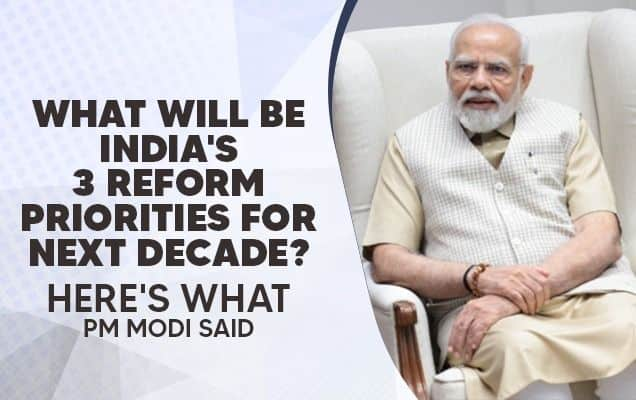On the evening of Thursday 17th March 2016, Prime Minister addressed the World Sufi Forum at New Delhi’s Vigyan Bhavan. The four-day event, which has been organized by the All India Ulama and Mashaikh Board, brings together several international dignitaries from 20 countries. The event witnessed the presence of spiritual leaders, scholars, academicians and theologists from Egypt, Jordan, Turkey, UK, USA, Canada, Pakistan and other nations.

PM Narendra Modi’s extensive address focussed on the rich and glorioius history of Sufism, the vitality of tolerance and compassion and on the need for all humanitarian forces to join ranks and challenge forces of terror and hatred. The Prime Minister categorically denied any link between religion and terror and added that those spreading terror in the name of religion are nothing but anti-religious. The Prime Minister’s speech was widely appreciated by those at the programme and by eminent commentators.
The Prime Minister described the World Sufi Forum as an assembly of those, "whose life itself is a message of peace, tolerance and love." "At a time when the dark shadow of violence is becoming longer, you are the noor, or the light of hope. When young laughter is silenced by guns on the streets, you are the voice that heals," the Prime Minister told the assembled gathering of Sufi scholars and spiritual leaders.
The Prime Minister said that Sufism has emphasized an enduring lesson of human history – that it is through openness and enquiry, engagement and accommodation, and respect for diversity that humanity advances, nations progress and the world prospers.

Elaborating further, Prime Minister opined that for the Sufis, service of God meant service to humanity. "In the words of Khwaja Moinuddin Chishti, of all the worships, the worship that pleases the Almighty God the most is the grant of relief to the humble and the oppressed," the Prime Minister said.
The Prime Minister explained that the message of Sufism, is in harmony with the soul of the Bhakti saint’s saying in the Hindu tradition, “Into the bosom of the one great sea, Flow streams that come from hills on every side.”
It reminds us that when we think of the 99 names of Allah, none stand for force and violence, and that the first two names denote compassionate and merciful. Allah is Rahman and Raheem," the Prime Minister said. Sufism is the voice of peace, co-existence, compassion and equality; a call to universal brotherhood, he added.
Shri Narendra Modi explained how Sufism has helped strengthen the inclusive culture that is India's great contribution to the world's cultural tapestry.

The Prime Minister said that India is moving forward on the strength of the struggles, the sacrifices, the bravery, the knowledge, the skill, the art and the pride of every member of every faith in our diverse and yet united nation.
Referring to the global challenge of terrorism, the Prime Minister said that "when the spiritual love of Sufism, not the violent force of terrorism, flows across the border, this region will be the paradise on earth that Amir Khusrau spoke about."
When terrorism and extremism have become the most destructive force of our times, the message of Sufism has global relevance, he added.
Referring to the horrors unleashed across the world by terrorists, he said the impact of terrorism cannot be captured by statistics alone. "There are forces and groups that are instruments of state policy and design. There are others recruited to the cause in misguided belief", the Prime Minister said.
Describing the battle that mankind must fight against terror, he said that this "is not a confrontation against any religion. It cannot be. It is a struggle between the values of humanism and the forces of inhumanity." He said that this is a battle "that must be won through the strength of our values and the real message of religions."
He said that the message of Sufism is not just confined to combating terrorism, but also encompasses his creed of “Sab Ka Saath, Sab Ka Vikaas”.

Quoting extensively from holy scriptures and great mystics, the Prime Minister called for challenging "the forces of violence with the kindness of our love and universal human values."
Earlier, delivering the open remarks to the gathering, Hazrat Syed Mohammad Ashraf, Founder President of the All India Ulama and Mashaikh Board, said that the Muslims of India, stand confident of their future in this country, and committed to upholding the unity, integrity and territorial sovereignty of the nation. Cabinet Minister Najma Heptulla was present at the occasion.
Welcome to a land that is a timeless fountain of peace and an ancient source of traditions and faiths: PM @narendramodi
— PMO India (@PMOIndia) March 17, 2016
Welcome to the ancient city of Delhi- built by the genius of diverse peoples, cultures and faiths: PM @narendramodi https://t.co/Iy8hu3Nre5
— PMO India (@PMOIndia) March 17, 2016
This is an extraordinary event of great importance to the world, at a critical time for humanity: PM @narendramodi
— PMO India (@PMOIndia) March 17, 2016
At a time when the dark shadow of violence is becoming longer, you are the noor or the light of hope: PM @narendramodi
— PMO India (@PMOIndia) March 17, 2016
You have come from different lands and cultures, but you are united by a common faith: PM @narendramodi https://t.co/Iy8hu3vQmx
— PMO India (@PMOIndia) March 17, 2016
For the Sufis, service to God meant service to humanity: PM @narendramodi
— PMO India (@PMOIndia) March 17, 2016
Sufism is the voice of peace, co-existence, compassion and equality; a call to universal brotherhood: PM @narendramodi
— PMO India (@PMOIndia) March 17, 2016
Sufism blossomed in India’s openness & pluralism. It engaged with her spiritual tradition and evolved its own Indian ethos: PM @narendramodi
— PMO India (@PMOIndia) March 17, 2016
Sufism’s contribution to poetry in India is huge. Its impact on the development of Indian music is profound: PM @narendramodi
— PMO India (@PMOIndia) March 17, 2016
All our people, Hindus, Muslims, Sikhs, Christians, Jains, Buddhists, Parsis, believers, non-believers, are an integral part of India: PM
— PMO India (@PMOIndia) March 17, 2016
Just as it once came to India, today Sufism from India has spread across the world: PM @narendramodi https://t.co/Iy8hu3Nre5
— PMO India (@PMOIndia) March 17, 2016
Let me paraphrase what I have said before: Terrorism divides and destroys us: PM @narendramodi https://t.co/Iy8hu3Nre5
— PMO India (@PMOIndia) March 17, 2016
Terrorism uses diverse motivations and causes, none of which can be justified: PM @narendramodi
— PMO India (@PMOIndia) March 17, 2016
The fight against terrorism is not a confrontation against any religion. It cannot be: PM @narendramodi
— PMO India (@PMOIndia) March 17, 2016
Diversity is a basic reality of Nature and source of richness of a society; and, it should not be a cause of discord: PM @narendramodi
— PMO India (@PMOIndia) March 17, 2016
At the beginning of a new century, we are at yet another point of transformation on a scale rarely seen in human history: PM @narendramodi
— PMO India (@PMOIndia) March 17, 2016














